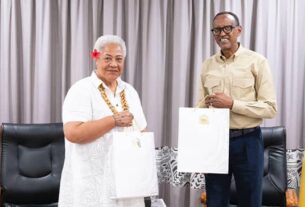Rwandan President Paul Kagame has called for a further inclusive and indifferent approach to Africa’s implicit representation on the United Nations Security Council( UNSC). His offer centers on icing that any endless seats allocated to Africa are participated in a manner that reflects the diversity and collaborative interests of the mainland. Specifically, Kagame has suggested a rotational system for the two endless seats Africa may admit, aiming to help dominance by any single country and foster broader representation.
Kagame’s offer outlines a structure where one of Africa’s endless seats on the Security Council would be held by the African Union Commission( AUC), while the other would rotate among individual African countries. This system, he believes, is crucial to maintaining equity and inclusivity, allowing all African nations to have a stake in the mainland’s representation on the global stage.
“ One endless seat would have to be held by the AU Commission, and the alternate seat by an African country on a rotational base. It should n’t be held by any single country permanently, ” Kagame emphasized. His reflections reflect his commitment to icing that Africa’s implicit part in the Security Council does n’t immortalize inequality within the mainland but rather strengthens concinnity and participated responsibility.
The offer comes amidst broader conversations about reforming the UNSC to more reflect the geopolitical realities of the 21st century. The current structure, which has remained largely unchanged since the UNSC’s commencement in 1945, has been blamed for disproportionately favoring a many important nations while underrepresenting regions like Africa. As the mainland with 54 nations and a growing influence in global affairs, Africa has long supported for lesser representation in transnational decision- making processes, including the Security Council.
Kagame’s position aligns with enterprises raised by Kenyan Ambassador Martin Kimani, head of the Center on International Cooperation( CIC), who has also counted in on the debate girding Africa’s implicit endless seats. While probative of Africa’s shot for lesser representation, Kimani has advised against a structure that could lead to divisions within the mainland. He expressed concern that the two endless seats, if not precisely managed, could be sewed up by a many dominant countries, marginalizing lower nations and undermining the collaborative interests of Africa.

Kimani advised that such an outgrowth could transfigure the African Union into a “ club of two titans and 53 minnows, ” eroding the concinnity and inclusivity that the AU strives to promote. He stressed the significance of designing a system that serves Africa’s long- term pretensions of integration and development, rather than buttressing being global power imbalances.
“ Reforms must align with Africa’s broader bournes , ” Kimani argued.However, they risk getting emblematic palms that fail to advance the mainland’s interests or contribute meaningfully to global peace and security, “ If these seats are n’t allocated in a way that prioritizes concinnity and fairness. ”
The drive for Africa to gain two endless seats on the Security Council stems from a recognition of the mainland’s growing significance in transnational affairs. Africa is home to over 1.4 billion people, a wealth of natural coffers, and some of the swift- growing husbandry in the world. Despite this, its part in global decision- timber remains limited, with no endless representation on the UNSC. Securing endless seats would enhance Africa’s capability to impact critical opinions on issues similar as conflict resolution, transnational security, and profitable development.
One of the crucial powers held by endless members of the UNSC is the capability to blackball judgments , a honor presently reserved for the five endless members the United States, the United Kingdom, France, Russia, and China. Adding African voices to this exclusive group would not only elevate the mainland’s influence but also bring a more balanced perspective to global governance.
Kagame’s emphasis on a rotational system reflects his broader vision of a united and influential Africa that laboriously shapes its own fortune. By proposing that one seat be held by the AU Commission, Kagame ensures that Africa’s collaborative interests are represented at the global position. The AU, as the mainland’s premier political and profitable association, is well- deposited to advocate for programs that profit all African nations, rather than a select many.
Meanwhile, the rotational allocation of the alternate seat would allow individual African countries to take turns representing the mainland, fostering inclusivity and icing that lower nations also have a voice in global affairs. This approach would help the attention of power in a many dominant countries and support the principles of equity and solidarity that bolster the African Union.
 Kagame’s offer also reflects the need for Africa to present a united front in its shot for UNSC reform. While there’s wide agreement among African nations on the need for lesser representation, differing opinions on how to achieve this thing have occasionally hindered progress. By championing for a system that balances collaborative representation through the AU with individual participation through a rotational seat, Kagame offers a result that could bridge these divides.
Kagame’s offer also reflects the need for Africa to present a united front in its shot for UNSC reform. While there’s wide agreement among African nations on the need for lesser representation, differing opinions on how to achieve this thing have occasionally hindered progress. By championing for a system that balances collaborative representation through the AU with individual participation through a rotational seat, Kagame offers a result that could bridge these divides.
The debate over Africa’s representation on the Security Council also raises broader questions about the part of the UNSC in addressing contemporary global challenges. Critics argue that the current structure, dominated by the five endless members, has failed to adequately address issues similar as climate change, global health heads, and the growing trouble of cyberattacks. Expanding the Council to include further different voices, including those from Africa, could enhance its effectiveness and legality in diving these complex challenges.
Kagame’s call for inclusivity and equity in Africa’s representation on the UNSC reflects his broader commitment to strengthening the mainland’s part in global governance. By championing for a system that prioritizes fairness and participated responsibility, he underscores the significance of concinnity in achieving Africa’s bournes for peace, development, and substance.
As conversations on UNSC reform continue, Kagame’s offer serves as a memorial of the need to prioritize Africa’s collaborative interests over individual intentions. By icing that all African nations have an occasion to contribute to global decision- timber, the proposed rotational system would not only enhance the mainland’s influence but also promote the values of equity and solidarity that are essential for a united Africa.
Eventually, Kagame’s vision for Africa’s representation on the Security Council is about further than just securing seats it is about reshaping global governance to reflect the realities and bournes of a different and dynamic world. Through his leadership, Kagame continues to support a future where Africa’s voice is heard, admired, and valued on the transnational stage.



